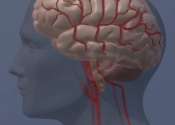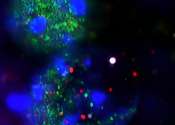Over years, depression changes the brain, new study shows
Is clinical depression always the same illness, or does it change over time?
Feb 27, 2018
0
374
Is clinical depression always the same illness, or does it change over time?
Feb 27, 2018
0
374
A new brain imaging study by the Centre for Addiction and Mental Health (CAMH) shows for the first time that brain inflammation is significantly elevated - more than 30 per cent higher - in people with obsessive-compulsive ...
Jun 21, 2017
1
1568

Just as you can't make an omelet without breaking eggs, scientists at Albert Einstein College of Medicine have found that you can't make long-term memories without DNA damage and brain inflammation. Their surprising findings ...
Mar 27, 2024
1
532

Neurological complications of Covid-19 can include delirium, brain inflammation, stroke and nerve damage, finds a new UCL and UCLH-led study.
Jul 7, 2020
2
2898

The blood-brain barrier is a network of specialized cells that surrounds the arteries and veins within the brain. It forms a unique gateway that both provides brain cells with the nutrients they require and protects them ...
Dec 6, 2016
1
1194

Most research on spinal cord injuries has focused on effects due to spinal cord damage and scientists have neglected the effects on brain function. University of Maryland School of Medicine (UM SOM) researchers have found ...
Nov 14, 2014
0
2
A drug used to slow cognitive decline in adults with Alzheimer's disease appears to reverse brain inflammation and neuron damage in rats exposed to alcohol during adolescence.
Aug 20, 2019
0
1753

Researchers at the University of Toronto and UC San Francisco have discovered that the intestine is the source of immune cells that reduce brain inflammation in people with multiple sclerosis (MS), and that increasing the ...
Jan 3, 2019
0
1378

(HealthDay)—Seeking better insight into chronic fatigue syndrome, a new brain scan investigation has pinpointed what could be the first evidence of a connection between nerve cell inflammation and the onset of this debilitating ...
May 3, 2014
2
0

Even mild concussions cause severe and long-lasting impairments in the brain's ability to clean itself of toxins, and this may seed it for Alzheimer's disease, dementia and other neurodegenerative problems, new research from ...
Sep 10, 2020
1
743

Encephalitis is an acute inflammation of the brain. Encephalitis with meningitis is known as meningoencephalitis. Symptoms include headache, fever, confusion, drowsiness, and fatigue. More advanced and serious symptoms include seizures or convulsions, tremors, hallucinations, and memory problems.
This text uses material from Wikipedia licensed under CC BY-SA